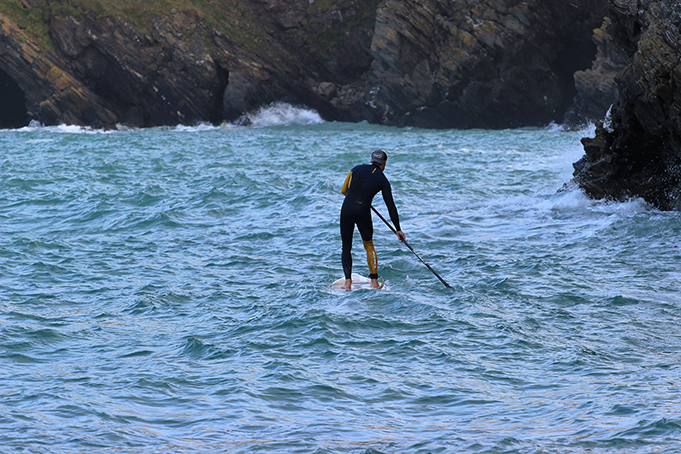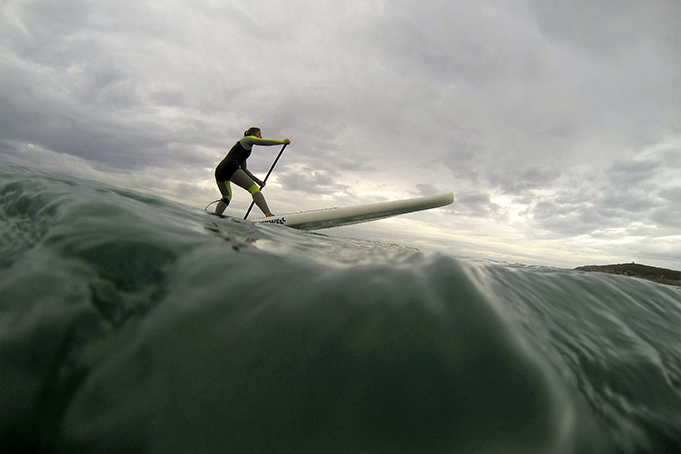PADDLE SCIENCE #10 –
THE POWER OF SLEEP
Words – Kate Starling
We spend a third of our life doing it and would die without it. What are we talking about? Sleep. Sleeping less than six to seven hours each night can have a catastrophic effect on your immune system, doubles your risk of getting cancer and can increase the risk of Alzheimers, cardiovascular disease, stroke and heart failure. Lack of sleep over just one week can also disrupt your blood sugar levels so profoundly that if you had your blood glucose levels tested you would be classed as pre-diabetic.
W hen it comes to sport, sleep plays a significant role in recovery. Without it, your performance level will drop, your reaction times will slow and you’ll run a much higher chance of picking up injuries which will take longer to heal. If you want to maximise how you feel and perform in any sport, then getting enough sleep each night is critical.
Sport, Sleep and Recovery
Every time you exercise, your muscles accumulate numerous microscopic tears which need to be repaired in order for them to become stronger. The process of repair is helped by good nutrition but ultimately requires the most significant factor of all: sleep. Sleep is essential for every single cellular function within the body and plays a crucial role in recovery.
When we go to bed and switch the lights off at night, the ensuing darkness encourages the pineal gland in the brain to release melatonin. This hormone regulates our circadian rhythm and helps to modulate when we fall asleep and when we wake up. However, melatonin has a wide range of other properties which are extremely important for total body recovery.

Intense exercise is associated with an increased level of oxidative stress and the production of oxidative radicals. This can cause damage to cells and can lead to inflammation within the muscles and soft tissues. To overcome this, melatonin is released to help boost recovery. Research shows that melatonin is one of the body’s most powerful and active anti-oxidants and free radical scavengers, being twice as active in this area as vitamin E. When released, melatonin activates other pro-inflammatory enzymes which further help to neutralise oxidative damage. During the deep sleep stage, melatonin also promotes the release of hormones such as growth hormone and androgens. These hormones are critical for immune function and cell regeneration, enabling your body to repair and strengthen your muscles and bones. It also helps to oxidise fat, helping to aid weight loss. When you fail to get enough sleep, the level of the stress hormone cortisol increases within the body and will block protein synthesis and activate pathways which lead to muscle protein breakdown. A lack of sleep and therefore a drop in melatonin production can therefore lead to a loss of muscle mass, hindrance of muscle recovery and due to inadequate repair, can also increase the chances of getting injured.
As melatonin is released in low/high levels in response to low/high levels of light, it is extremely sensitive to the level of light there is around you when you sleep. This means, that sleeping in a nice dark room is paramount in order to maximise the quality of your sleep. This is particularly important if you’re getting up for early morning gym or training sessions.
“Sleep is critical to your physical and mental restoration. Research shows that an extended sleeping time of ten hours each night enhances physical performance and elevates overall mood”
Sleep Deprivation and Performance
How many hours sleep do you get each night? Do you wake frequently? Does the amount of sleep you get alter in response to exercise or training demands? If you’re training competitively or have set yourself a busy training regime with early morning starts, it’s likely that you’re getting less sleep than you need. Lack of sleep affects training and performance by significantly reducing your reaction times. If you miss out on one night’s sleep entirely, this reduction in reaction speed can be as high as 300%, requiring several days to get back to normal. The loss in reaction times is perhaps the reason why lack of sleep is strongly linked to a higher risk of injury in any chosen sport. Not only are the hours you sleep proven to be the strongest indicator of injury but once you are injured, lack of sleep will seriously reduce the time your body has to regenerate new cells and repair itself, meaning it will take you longer to get over whatever injury you may have picked up. Interestingly, reduction in sleep will increase levels of perceived exertion and pain perception, meaning that when you are injured, any injury can also feel more painful. Sleep deficit can also significantly compromise your immune system, making you more susceptible to picking up bugs and becoming ill. If you notice that you’re getting more colds than usual or are unable to shake off an infection then the amount of sleep you’re getting may be to blame.
Have you ever considered the effect sleep may have on your performance? Studies into athletic performance show that reduced sleep can reduce maximal bench-press and deadlift weight, limiting the ability to train effectively to enhance strength and power. Sleep reduction can also reduce the learning and memory required for consolidating new skills. The effect of lack of sleep has also been investigated on different energy systems. Studies show that sprinters who work anaerobically produce slower sprint times following sleep deprivation over two consecutive nights. Twenty-four hours of reduced sleep can also reduce aerobic performance in endurance based exercise over thirty minutes. This means, that irrespective of the energy system you use when exercising, a consistent level of sleep is required to diminish performance losses.
Sleep is critical to your physiological, biochemical and cognitive restoration. Research into sleep deprived basketball players, shows that an extended sleeping time of ten hours each night enhanced sprint time, shooting accuracy, increased reaction times and a better overall mood. Similar improvements in performance have also been found in swimmers, tennis players and weight lifters. If increasing your sleep at night time isn’t possible, then napping during the day for thirty minutes can help to enhance the recovery your body needs. It’s not the ideal way but it can be a valuable option. However, aim to avoid having naps late in the afternoon as this can adversely affect your ability to fall asleep at night.
Meanwhile, sleep loss can dramatically affect your cognitive function. It impairs the frontal lobe of the brain and reduces your ability to make decisions and think logically. It can also lead to reduced motivation and concentration. If you’re struggling to learn new skills then think about how much shut-eye you tend to have each night. Increasing your sleep promotes optimal cognitive function which will facilitate your learning and ability to perform well.

How To Get the Best Night’s Sleep
• Sleep in a darkened room so that your production of the hormone melatonin isn’t disrupted
• Avoid any stimulating activity before trying to get to sleep. The body must be in a relaxed state for 5-20 minutes before going to sleep so put down your phone and turn off your laptop and TV
• Avoid drinking that nice strong coffee before you go to bed – caffeine is notorious for keeping you wide awake when you least want to be
• Set a night time routine where sleeping and waking times are consistent to increase the quality of each night’s sleep. Improving sleep quality encourages the transition from one sleep stage to another, increasing the amount of Rapid Eye Movement (REM) sleep you get. REM sleep is critical for optimising recovery and will make you feel much fresher and more alert when you first wake up
• Get the temperature right. Temperature influences the onset of sleep and the efficiency of each sleep stage. Temperatures above or below 29C can disrupt sleep and keep you awake at night. If you’re too hot in bed, it can be more difficult to fall asleep and will reduce the amount of REM you get. As you fall asleep, your core temperature will start to drop whilst your peripheral temperature will increase as blood flow increases to your skin. This helps to accelerate the onset of sleep and is strongly linked to melatonin production. Choosing the right bedding and what you wear at night in bed is therefore important to optimise your temperature
• Manage and try to reduce any anxiety or stress as both can keep your mind ticking over late at night when all you want to do is switch off and fall asleep
For both psychological and physical recovery, typically, seven to nine hours sleep each night is recommended. Psychologically it enables to you learn, keeps you motivated and boosts your memory. Meanwhile, physically, it serves to maintain your metabolism, repairs soft tissues and reduces inflammatory change within the body. If you’ve been training more than normal or are noticing that you’re not sleeping well or don’t feel refreshed on waking each morning then aim to spend a couple of extra hours in bed. It doesn’t matter how well you eat or how optimal your diet is if you fail to get enough sleep each night. Sleep is critical for adequate recovery so climb into bed early this evening and sleep well. SUP
Kate is a physiotherapist and standup paddler. Reach her at www.newquayphysio.co.uk


